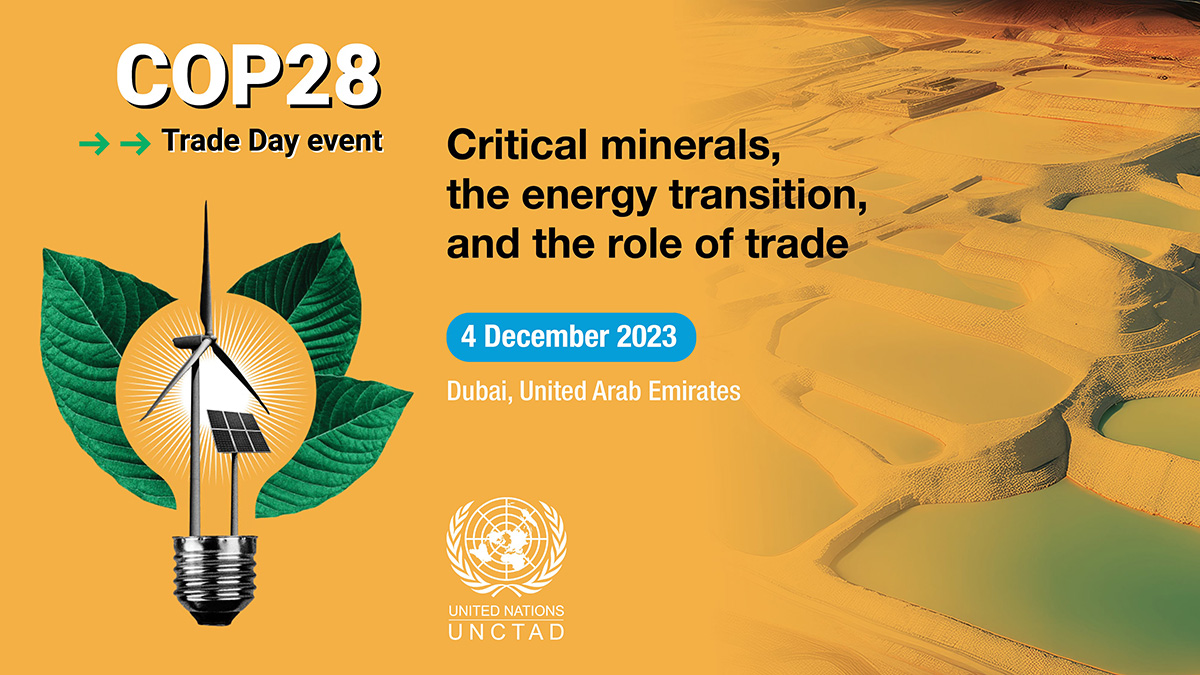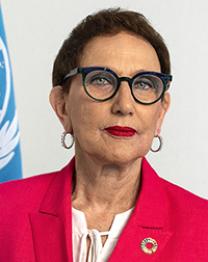COP28 Trade Day event: Critical minerals, the energy transition and the role of trade

The upcoming COP28 United Nations climate summit, which will take place from 30 November to 12 December in Dubai, will spotlight the role of trade in goods and services and trade policy can play in bolstering and accelerating the clean energy transition.
The conference, hosted by the United Arab Emirates (UAE), will dedicate an entire day to discussions on trade, the first of its kind within the context of a UN climate conference. The Trade Day is scheduled for 4 December 2023.
“Trade Day” at COP28 will highlight trade’s potential as a catalyst for climate-smart development, focusing on issues like value-chain decarbonization and resilience.
As part of the Trade Day events, UNCTAD and the COP28 Presidency are organising a session on “Critical minerals, the energy transition, and the role of trade.”
The session will address how trade policy and the multilateral system can facilitate an enabling international trade and investment environment that will help to secure energy transition-related value chains while increasing mineral-rich countries' benefits by fostering 'on-site' value addition and, thereby, creating socio-economic development opportunities.
Background information
The anticipated significant growth in the demand for critical minerals in the upcoming decades to support the energy transition could offer unique development opportunities for mineral-rich developing countries if a different approach is taken. The anticipated investment in extraction and processing is vastly insufficient to meet the expected demand and a just, equitable and sustainable transition.
There is a need for countries to strengthen their domestic capacities to leverage development gains avoiding another natural resource curse at the expense of people and planet. UNCTAD’s work on trade of critical minerals addresses current and projected trends in critical minerals' demand and supply as well as social, economic, and environmental impacts of the exploitation of these minerals and offers policy recommendations to facilitate sustainable exploitation, enhanced trade diversification, and domestic resource mobilization for structural transformation to achieve the SDGs.
There is also a need for robust and effective governance. During the Secretary-General’s Climate Ambition Summit in September (in support of the UN Secretary General's Working Group on Transforming the Extractive Industry for Sustainable Development initiative “Harnessing Critical Energy Transition Minerals for Sustainable Development in LDCs and LLDCs Just Transitions in Low Carbon Technologies"), governments signalled their support for a UN-led effort to create a set of global voluntary principles on Critical Energy Transition Minerals, (see: Chair’s Summary of the Climate Ambition Summit 2023). These minerals are vital for the shift from fossil fuels to renewables, but to date, their use has lacked a global framework to address sourcing and policy coordination. Leaders agreed that only the United Nations can act as neutral broker to ensure a just, equitable and sustainable expansion of these resources and the emerging industries they create.
The objective of the session is to forge consensus on the need to foster domestic value-addition to critical minerals in producing developing countries to increase supply chains resilience, and sustainability, and to ensure fairer distribution of benefits from trade in critical minerals-based products to all value chain participants.
Programme
Moderator:
- Mr. John Defterios, Visiting Professor of Business, NYU Abu Dhabi
Speakers:
- Ms. Rebeca Grynspan, Secretary-General, UNCTAD
- H.E. Mr. Jean Lucien Bussa Tongba, Minister of Trade, DRC
- H.E. Ms. Lucia lipumbu, Minister of Trade, Namibia
- H.E. Ms. Kristin Tilley, Ambassador for Climate Change, Australia
- Mr. Rohitesh Dhawan, President and CEO, International Council on Mining and Metals
- Mr. Selwin Hart, Assistant Secretary-General for Climate and Special Adviser to the Secretary-General, United Nations
In September 2021, Rebeca Grynspan was appointed Secretary-General of the United Nations Conference on Trade and Development (UNCTAD), becoming the first woman to lead the organization in its 60-year history.
Rebeca Grynspan, an economist and former Vice President of Costa Rica, is an experienced leader of international institutions with a substantive track record in government, UN diplomacy, economic policy and multilateral cooperation at the global level.
Prior to joining the United Nations, she was Vice President of Costa Rica and held cabinet positions as Minister of Housing, Minister Coordinator of Economic and Social Affairs and Deputy Finance Minister.
Previously, she served as Secretary-General of the Ibero-American Conference (2014–2021), chairing regional summits of Heads of State and Government; United Nations Under-Secretary-General and Associate Administrator of the United Nations Development Programme (UNDP); and UNDP Regional Director for Latin America and the Caribbean. She was a member of the UN Commission for the Reconstruction of Haiti, representing the UN Secretary-General.
At UNCTAD, Grynspan has been at the centre of critical negotiations to address global trade and development challenges. She played a decisive role in the successful Black Sea Grain Initiative brokered between the UN, Türkiye, the Russian Federation and Ukraine, which enabled the safe export of over 32 million tons of grain, lowered global food prices by 22% and prevented millions from falling into food insecurity. She also leads the UN Global Crisis Response Group on food, energy and finance, and has represented the UN in G20 summits.
Her leadership has been recognized widely. In 2024, she received the Doha Negotiator of the Year Award for spearheading UN efforts to restore Black Sea trade routes. In 2025, Spain’s Ministry of Foreign Affairs, European Union and Cooperation awarded her the inaugural Isabel Oyarzábal Women in Multilateralism International Prize for her contribution to multilateralism.
Ms. Grynspan holds degrees in economics from the University of Costa Rica and the University of Sussex, and honorary doctorates from several European universities.



